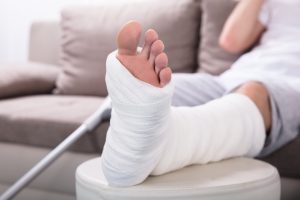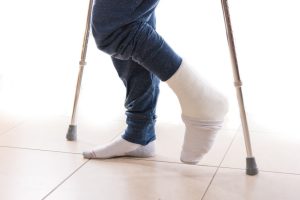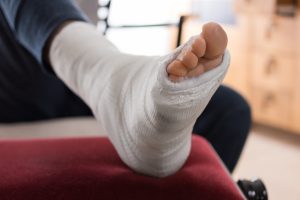If you have suffered a foot injury at work, you may be wondering whether you could be eligible to claim compensation. Within this guide, we will discuss the personal injury claims criteria that must be met in order to make a valid claim for an accident at work.
Additionally, we will explain how compensation could be calculated and the different heads of loss that could be awarded in a successful personal injury claim. This guide will also provide examples of how different accidents at work could lead to suffering different types of foot injuries.
Furthermore, we will discuss what evidence is needed for a personal injury claim and how gathering sufficient evidence could help with supporting your case. This guide will end by looking at the various advantages of making your claim with one of the solicitors on our panel on a No Win No Fee basis.
If you have any specific questions you would like answering, or to receive free advice for your case, you can contact our team of advisors. They can be reached by:
- Contacting us online to receive a callback.
- Calling 020 8050 2736
- Asking a question by using our live chat pop-up.

Jump To A Section
- Potential Compensation For A Foot Injury At Work
- What Is The Eligibility Criteria When Making A Claim For A Foot Injury At Work?
- When Could Employer Negligence Lead To You Claiming Foot Injury Compensation?
- Potential Evidence For Foot Injury Compensation Claims
- Use A No Win No Fee Solicitor To Claim Foot Injury Compensation
- More Resources About How To Make Foot Injury At Work Claims
Potential Compensation For A Foot Injury At Work
If you make a successful personal injury claim after suffering a foot injury at work, you will receive the head of loss known as general damages as part of your compensation settlement. Later in this guide, we will explain the eligibility criteria you must meet in order to make a personal injury claim.
General damages provides you with compensation for the physical and mental pain and suffering you injury has caused you.
Those tasked with valuing this head of your claim may refer to the Judicial College Guidelines (JCG). This publication offers guideline compensation brackets for a variety of injuries. We have used some of the entries listed within the JCG for minor to very severe foot injuries in the table below. Please only refer to them as a guide. Additionally, the top entry has not been taken from the JCG.
Guideline Compensation Brackets
| Injury | Severity | Award Bracket Guideline | Definition |
|---|---|---|---|
| Multiple Serious Injuries and Special Damages | Severe | Up to £500,000+ | Severe multiple injuries and their special damages such as prescription fees, lost earnings and care costs. |
| Foot Injuries | (a) Amputation of Both Feet | £169,400 to £201,490 | The ankle joint will be lost for both feet. |
| Foot Injuries | (b) Amputation of One Foot. | £83,960 to £109,650 | The ankle joint will be lost. |
| Foot Injuries | (c) Very Severe | £83,960 to £109,650 | Cases of severe pain or a very serious level of disability which is permanent in nature, such as the traumatic amputation of the forefoot. |
| Foot Injuries | (d) Severe | £41,970 to £70,030 | Cases of fractures to both heels or feet causing mobility to be substantially restricted and resulting in considerable pain that is permanent. |
| Foot Injuries | (e) Serious | £24,990 to £39,200 | Cases where pain is ongoing as a result of traumatic arthritis and prolonged treatment with the risk of fusion surgery. |
| Foot Injuries | (f) Moderate | £13,740 to £24,990 | This bracket looks at displaced metatarsal fractures which result in a permanent deformity and cause continuing symptoms. |
| Foot Injuries | (g) Modest | Up to £13,740 | This covers uncomplicated fractures, ligament tears, puncture wounds and similar injuries. |
| Toe Injuries | (c) Severe | £13,740 to £21,070 | One or two toes other than the great toe have been amputated due to a severe crush injury. |
| Toe Injuries | (d) Serious | £9,600 to £13,740 | The great toe suffers a serious injury or multiple toes will suffer a crush injury or multiple fractures. |
Special Damages In Foot Injury Claims
Special damages are the second head of loss that could be awarded to you. This compensates you for the financial losses you have experienced due to suffering a foot injury at work. This could include:
- Loss of past or future earnings due to taking time off work to recover from your injury.
- The cost of care if you have required help with daily tasks such as cleaning.
- Medical expenses such as paying for prescriptions.
- Travel fares to essential appointments.
When claiming for these losses, you must be able to provide evidence of them. This could include bank statements, invoices and payslips.
Contact our advisors today if you have any questions about foot injury compensation payouts, or to receive a free valuation of how much compensation you could potentially claim for your foot injury.
What Is The Eligibility Criteria When Making A Claim For A Foot Injury At Work?
Your employer owes you a duty of care while you are in the workplace and performing your work-related duties. They must take reasonable and practicable steps to minimise the risk of workplace accidents and help ensure your health and safety, as outlined within the Health and Safety at Work, etc. Act 1974. This could include performing regular risk assessments and providing personal protective equipment (PPE) when required.
To be able to make a foot injury at work claim, you will need to meet the following personal injury eligibility criteria:
- Your employer owed you a duty of care.
- This duty was breached by your employer.
- Due to this breach, you suffer a physical or psychological injury at work.
Additionally, all valid claims must meet the personal injury claims time limit. The is set out as generally 3 years from the accident date under the Limitation Act 1980. However, there are certain exceptions to this limitation period.
To learn what these exceptions are, or to see whether you may have a valid personal injury claim, you can contact a member of our advisory team.
When Could Employer Negligence Lead To You Claiming Foot Injury Compensation?
There are various ways that you could suffer a foot injury at work. However, as previously mentioned, to have a valid claim, your injury must have been caused by your employer breaching their duty of care.
Some examples of how various foot injuries could be suffered in the workplace include:
- While working in an office, your employer fails to tidy away some trailing computer wires. You trip on these wires and suffer a soft tissue injury in your foot and a sprained ankle.
- While working on a construction site, your employer failed to provide you with safety boots, despite you needing them to perform your job safely. Due to this, you suffer a puncture wound in your foot due to stepping on a nail.
- Your employer asks your colleague to operate a forklift, despite knowing that they have received no training on how to use one. Due to this, they lose control of the forklift and run over your foot, causing you to suffer a severe crush injury.
These are only a few examples. To see whether you could be eligible to make a personal injury claim for your injuries, you can contact one of the advisors on our team.
Potential Evidence For Foot Injury Compensation Claims
Gathering sufficient evidence is an important step in the personal injury claims process. It can help with proving how your employer was liable for the accident that caused your injured foot.
Some examples of evidence that could help with supporting foot injury claims include:
- Witness contact details from those who saw the accident take place. They may be able to provide a statement later on.
- Any CCTV footage that captures how you suffered your foot injury at work.
- A copy of your medical records, confirming the type of foot injury you suffered and the treatment it required.
- A copy of the report in the workplace accident book. This could provide information on when and how the accident occurred.
If you decide to work with a solicitor on your case, they could help you with gathering this and additional evidence to support your claim. To see whether you could be eligible to work with one of the personal injury solicitors on our panel, you can contact our advisors.
Use A No Win No Fee Solicitor To Claim Foot Injury Compensation
If you have a valid foot injury at work claim, you may wish to instruct the services of a solicitor. One of the personal injury solicitors on our panel could help you claim compensation by gathering evidence on your behalf to support your case. They could also negotiate a settlement on your behalf.
Additionally, the solicitors on oour panel usually offer their services through a type of No Win No Fee agreement called a Conditional Fee Agreement (CFA).
Usually, this means that there will be no upfront fees to pay to your solicitor for them to begin working on your foot injury claim. You also won’t need to pay them for their work if the claim is ongoing or if it ends unsuccessfully.
Should your foot injury compensation claim succeed, you will pay a small percentage of your compensation to your solicitor. This is referred to as a success fee. The law also limits the percentage that this fee can be.
Contact Our Team
To check whether you could make a personal injury claim if you have suffered a foot injury at work, you can contact a member of our advisory team. They can check the eligibility of your case, and then may connect you with a No Win No Fee solicitor from our panel. Our advisors can also help answer any additional questions you may have.
Connect with them today by:
- Contacting us online to receive a callback.
- Calling 020 8050 2736
- Asking a question using the live chat pop-up.
More Resources About How To Make Foot Injury At Work Claims
Please read some more of our guides below:
- Guidance for claiming compensation for a toe injury in this guide.
- Here we look at some of the most common causes of injury at work.
- This guide looks at when you could make a fall at work claim and the time limits that must be adhered to.
Additionally, these external links may be useful:
- Read about claiming Statutory Sick Pay (SSP) from Gov.UK.
- A guide regarding specified injuries to workers from the Health and Safety Executive (HSE).
- Advice regarding foot pain and injury from the NHS.
If you have suffered a foot injury at work and are still unsure whether you could make a personal injury claim, you can contact one of our advisors.



